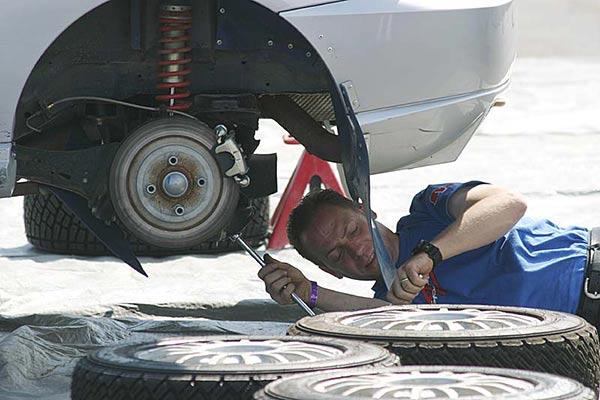It often starts small -- you do a job or two for friends and neighbors. In exchange for a relatively simple auto maintenance or repair procedure, you take a few dollars and don't think much more about it. Then a friend of that neighbor calls, and the next thing you know, you have a nice little business on the side. But what are the ethics involved in burning the midnight oil as an auto technician?
Keep the Boss Informed
Doing an occasional job for a friend is one thing; working for paying strangers is another matter entirely. When you cross that line, you have to inform your boss that you are working for yourself.
"If you are infringing on the employer's sphere of business, you definitely have an ethical problem," says George Generas, an assistant professor at the Barney School of Business at the University of Hartford.
While Generas draws a distinction between specialized skills and the general skills more likely to be used for many automotive maintenance and repair procedures, he notes that workers are generally prohibited from endeavors that impact their employers. "An agent owes loyalty to his principal, and employees are agents," Generas adds. "However, if the employer gives permission, there is a release of that obligation as long as the disclosure is complete."
You may tell your employer for practical and ethical reasons, including the fact that your boss is going to find out anyway. Remember that applications for any necessary licenses or permits are part of public record.
Clients Are Often Different
One redeeming aspect of this relationship is that your customers probably will not be your boss's customers. Generally, people who choose a part-time or after-hours service option for their vehicle do not go to larger garages or dealerships. They like dealing with an individual who both owns the business and does the work. Many of these customers also believe they end up paying less for service and repairs when dealing with a moonlighting technician. Not sharing customers with your employer makes the relationship much easier for all parties.
Nonetheless, "a lot of [garage owners] frown on it," says Andre Duval, a garage owner who admits to having done a little moonlighting before opening his own business, D & D Auto Repair in East Hartford, Connecticut. "I used to do it for friends and relatives," he says. "I never pounded the street looking for work."
Duval also worked on different brands on his own time. Still, he notes, "[garage] owners don't appreciate it."
Don't Fish for Business from the Company Pier
Never tell one of your employer's customers that you could do a better job for less money in your after-hours operation. Do that, and you have gone far beyond the boundaries of acceptable behavior. If word gets back to your boss, expect to be fired for cause. And the word will get back. Eventually, a customer will march in to your boss and quote you in hopes of getting a lower price.
Referrals to Your Employer are Fine
What if you're moonlighting with your employer's knowledge and you land a customer who wants you to do a job that's too big for your after-hours operation? At that point, feel free to refer the job to your employer -- just be sure to inform your employer first.
Keep Tools and Parts Separate
Never borrow a tool or take a part from your employer for your own work without seeking permission first or paying for it through proper channels. Doing so can create major misunderstandings that could lead to criminal charges. You decided to moonlight so you could earn extra money, not gain a firsthand introduction to the criminal justice system.
Competing with your employer will increase your income, but it will also increase the number of problems you face on a daily basis. Moonlighting can be an ethical minefield you must tread carefully.











